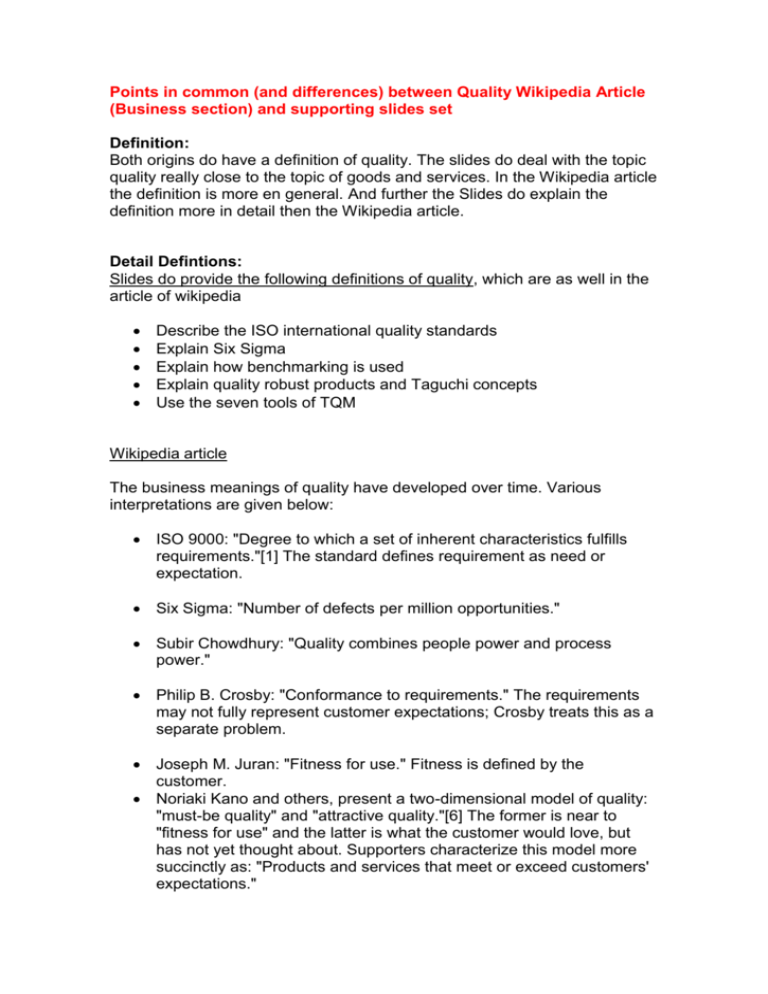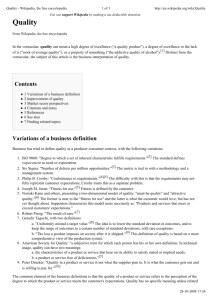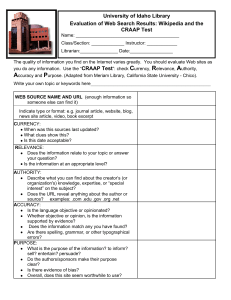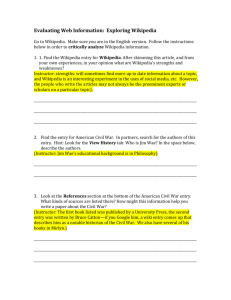Points in common (and differences) between Quality Wikipedia Article
advertisement

Points in common (and differences) between Quality Wikipedia Article (Business section) and supporting slides set Definition: Both origins do have a definition of quality. The slides do deal with the topic quality really close to the topic of goods and services. In the Wikipedia article the definition is more en general. And further the Slides do explain the definition more in detail then the Wikipedia article. Detail Defintions: Slides do provide the following definitions of quality, which are as well in the article of wikipedia Describe the ISO international quality standards Explain Six Sigma Explain how benchmarking is used Explain quality robust products and Taguchi concepts Use the seven tools of TQM Wikipedia article The business meanings of quality have developed over time. Various interpretations are given below: ISO 9000: "Degree to which a set of inherent characteristics fulfills requirements."[1] The standard defines requirement as need or expectation. Six Sigma: "Number of defects per million opportunities." Subir Chowdhury: "Quality combines people power and process power." Philip B. Crosby: "Conformance to requirements." The requirements may not fully represent customer expectations; Crosby treats this as a separate problem. Joseph M. Juran: "Fitness for use." Fitness is defined by the customer. Noriaki Kano and others, present a two-dimensional model of quality: "must-be quality" and "attractive quality."[6] The former is near to "fitness for use" and the latter is what the customer would love, but has not yet thought about. Supporters characterize this model more succinctly as: "Products and services that meet or exceed customers' expectations." Robert Pirsig: "The result of care."[7] Genichi Taguchi, with two definitions: a. "Uniformity around a target value."[8] The idea is to lower the standard deviation in outcomes, and to keep the range of outcomes to a certain number of standard deviations, with rare exceptions. b. "The loss a product imposes on society after it is shipped."[9] This definition of quality is based on a more comprehensive view of the production system. American Society for Quality: "A subjective term for which each person has his or her own definition. In technical usage, quality can have two meanings: a. The characteristics of a product or service that bear on its ability to satisfy stated or implied needs; b. A product or service free of deficiencies." Peter Drucker: "Quality in a product or service is not what the supplier puts in. It is what the customer gets out and is willing to pay for." W. Edwards Deming: concentrating on "the efficient production of the quality that the market expects,"[11] and he linked quality and management: "Costs go down and productivity goes up as improvement of quality is accomplished by better management of design, engineering, testing and by improvement of processes." Gerald M. Weinberg: "Value to some person". Quality Management Techniques Wikipedia Article Quality Management Systems Total Quality Management (TQM) Design of experiments Fractional factorial design Optimal design Response surface methodology Continuous improvement Six Sigma Statistical Process Control (SPC) Quality circles Requirements analysis Verification and Validation Zero Defects Theory of Constraints (TOC) Business Process Management (BPM) Business process re-engineering Capability Maturity Models Slides of the classes Continuous improvement Six Sigma Employee empowerment Benchmarking Just-in-time (JIT) Taguchi concepts Knowledge of TQM tools Quality Awards Wikipedia Article Malcolm Baldrige National Quality Award EFQM Deming Prize Slides of the lecture just deal with the Malcolm Baldrige National Quality Award. Other Stuff In Addition the slides provide other techniques for example the Fishbone Chart for making decisions. In general the Slides do describe the topics of the importance of Quality and also the costs occurring during the Managing Quality more in detail than the article of Wikipedia.





